
Edmund Crispin was the pseudonym of Robert Bruce Montgomery, an English crime writer and composer known for his Gervase Fen novels and for his musical scores for the early films in the Carry On series.
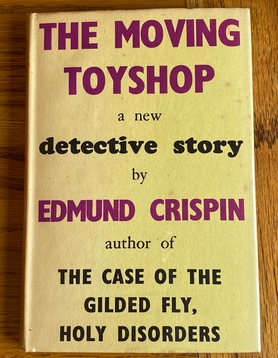
The Moving Toyshop (1946) is a work of detective fiction by Edmund Crispin, featuring his recurrent sleuth, Gervase Fen, an Oxford professor of English Language and Literature.
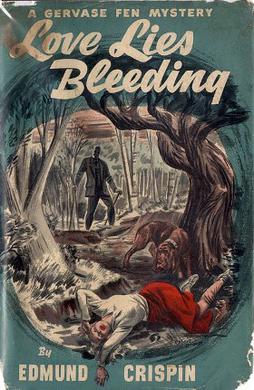
Love Lies Bleeding is a detective novel by Edmund Crispin, first published in 1948. Set in the post-war period in and around a public school in the vicinity of Stratford-upon-Avon, it is about the accidental discovery of old manuscripts which contain Shakespeare's long-lost play, Love's Labour's Won, and the subsequent hunt for those manuscripts, in the course of which several people are murdered. Collaborating with the local police, Oxford don Gervase Fen, a professor of English who happens to be the guest of honour at the school's Speech Day, can solve the case at the same weekend.
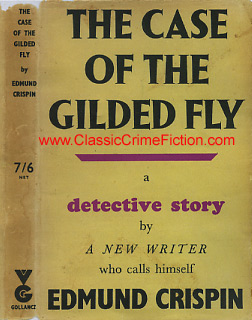
The Case of the Gilded Fly is a locked-room mystery by the English author Edmund Crispin, written while Crispin was an undergraduate at Oxford and first published in the UK in 1944. It was published in the US a year later under the title Obsequies at Oxford.
Gervase Fen is a fictional amateur detective and Oxford Professor of English Language and Literature created by Edmund Crispin. Fen appears in nine novels and two books of short stories published between 1944 and 1979. Fen is an unconventional detective who is often faced with a locked room mystery to solve.

Suddenly at His Residence is a 1946 crime novel by the British writer Christianna Brand. It is the third in a series featuring her detective Inspector Cockrill. In the United States it was published using the alternative title The Crooked Wreath.
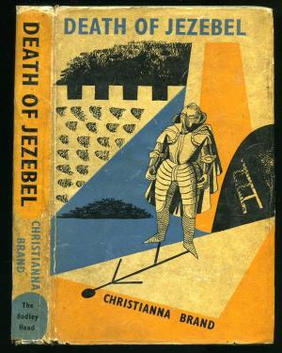
Death of Jezebel is a 1948 mystery crime novel by the British author Christianna Brand. It is the fourth entry in the series featuring the fictional police detective Inspector Cockerill, and sees him working alongside Inspector Charlesworth a character from Brand's debut novel Death in High Heels.

London Particular is a 1952 mystery crime novel by the British writer Christianna Brand. It is the fifth in a series of novels featuring her fictional police detective Inspector Cockrill and also portrays another of her characters Inspector Charlesworth. It was published in the United States in 1953 under the alternative title of Fog of Doubt.
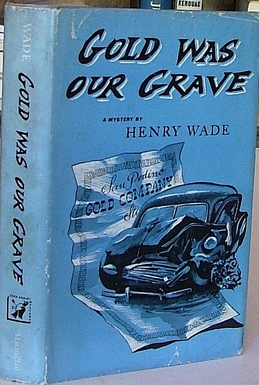
Gold Was Our Grave is a 1954 mystery detective novel by the British writer Henry Wade. It was the seventh and last in a series of novels featuring the character of Inspector Poole, published during the Golden Age of Detective Fiction.

The Widow's Cruise is a 1959 British detective novel by Cecil Day-Lewis, written under the pen name of Nicholas Blake. It is the thirteenth in a series of novels featuring the private detective Nigel Strangeways.
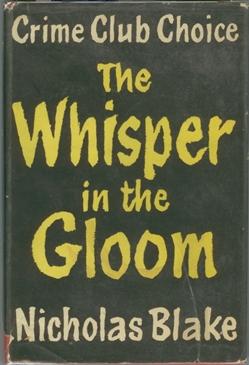
The Whisper in the Gloom is a 1954 mystery thrillery detective novel by Cecil Day-Lewis, written under the pen name of Nicholas Blake. It is the eleventh in a series of novels featuring the private detective Nigel Strangeways. The novel introduced the recurring character of Clare Massinger, a young sculptor who becomes a romantic interest of Strangeways.

A Tangled Web is a 1956 British crime novel by Cecil Day-Lewis, written under the pen name of Nicholas Blake. It was one of four stand-alone novels he wrote under the name alongside the Nigel Strangeways detective novels. It was published by Harper in the United States under the alternative title Death and Daisy Bland.
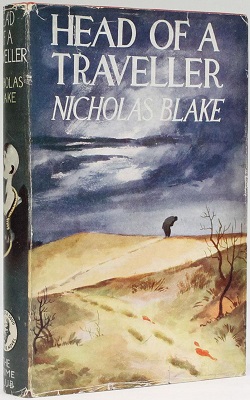
Head of a Traveller is a 1949 detective novel by Cecil Day-Lewis, written under the pen name of Nicholas Blake. It is the ninth in a series of novels featuring the private detective Nigel Strangeways.

Holy Disorders is a 1945 mystery novel by the English writer Edmund Crispin, the second in his series featuring the Oxford professor and amateur detective Gervase Fen. The novel is set during the Second World War. The title is a reference to Chaucer.

Swan Song is a 1947 detective novel by the British writer Edmund Crispin, the fourth in his series featuring the Oxford Don and amateur detective Gervase Fen. It was the first in a new three-book contract the author has signed with his publishers. It received a mixed review from critics.
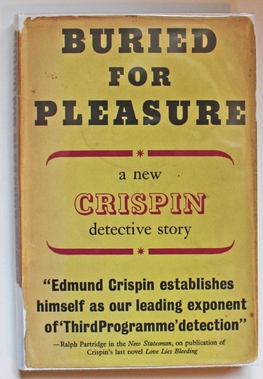
Buried for Pleasure is a 1948 detective novel by the British writer Edmund Crispin, the sixth in his series featuring the Oxford professor and amateur detective Gervase Fen. As with the rest of the Fen novels, a complex Golden Age-style mystery is combined with elements of farce. Fen contests a by-election in rural constituency, but events are rapidly overtaken by a murder case. It features Detective Inspector Humbleby who also appeared in the next novel Frequent Hearses as well as most of the short stories in the series.

Beware of the Trains is a collection of detective short stories by the British writer Edmund Crispin published in 1953. It contains sixteen stories including Beware of the Trains which gave its title to the collection. They all feature Crispin's amateur detective and Oxford professor Gervase Fen, an eccentric with a genius for solving complex cases. A number also featured Detective Inspector Humbleby of Scotland Yard who also appears in two of the novels in the Fen series. Apart from one they had all previously appeared in the Evening Standard newspaper. It was the last work featuring Fen for many years, until Crispin returned to the character for the 1977 novel The Glimpses of the Moon.
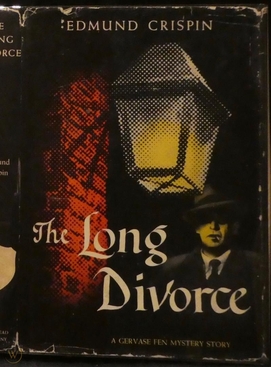
The Long Divorce is a 1951 detective novel by the British writer Edmund Crispin, the eighth in his series featuring the Oxford professor and amateur detective Gervase Fen. It was the penultimate novel in the series, with a gap or more than twenty five years before the next entry The Glimpses of the Moon, although a collection of short stories Beware of the Trains was published in 1953. The novel features many traits of a Golden Age mystery, set in a small, wealthy English village. The title doesn't refer to a marriage but is a quote from Shakespeare's Henry VIII "the long divorce of steel". It was published in the United States by Dodd, Mead in 1951 under the same title, and a year later as A Noose for Her.

The Three Taps is a 1927 detective novel by the British author Ronald Knox. Written during the Golden Age of Detective Fiction, it is the first in a series of five novels featuring the insurance investigator Miles Bredon. It is has been suggested that Knox's portrayal of Miles Bredon and his wife Angela as a crime-solving couple may have influenced Nick and Nora Charles's creation of The Thin Man. It was published in London by Methuen and in New York by Simon and Schuster. In 1930 the author was one of the founders of the Detection Club.

Frequent Hearses is a 1950 detective novel by the British author Edmund Crispin. It is the seventh in his series of novels featuring Gervase Fen an Oxford University professor and amateur detective. Published during the Golden Age of Detective Fiction, it is set in the British film industry where Fen has been employed as a historical advisor on The Unfortunate Lady, a biopic of the English poet Alexander Pope. The title is taken from a line of Pope's Elegy to the Memory of an Unfortunate Lady, "on all the line a sudden vengeance waits, and frequent hearses shall besiege your gates". It was published in the United States by Dodd, Mead the same year under the alternative title Sudden Vengeance.


















